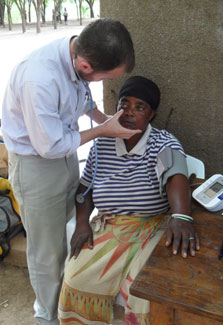Profile: Fogarty Scholar Dr John Stanifer studies kidney disease in Tanzania
January / February 2016 | Volume 15, Issue 1

Photo courtesy of Dr. John W. Stanifer
As a Fogarty Scholar, Dr. John Stanifer
investigated chronic kidney disease
prevalence and causes in Tanzania.
By Cathy Kristiansen
During his Fogarty fellowship in Tanzania, internist and nephrologist-in-training Dr. John W. Stanifer came to regard global health research as very much a two-way flow of knowledge, with patients hearing about kidney health from him and he learning about their lives to help determine how best to treat their kidney diseases.
"Based on my own perceptions, I could say, oh, you shouldn't go to traditional healers, those are bad," Stanifer said. "But if you really want to make a difference, you need to take an interest in other people's lives and learn about them and what they perceive the issues to be. If you both study each other, something valuable comes out of it."
Stanifer practiced this approach during his year in Tanzania as part of Fogarty's
Global Health Program for Fellows and Scholars, which provides a yearlong mentored clinical research experience overseas for postdoctoral fellows and pre-doctoral scholars. The
National Institute of Diabetes and Digestive and Kidney Diseases (NIDDK) also supported his fellowship.
For his research project, Stanifer investigated chronic kidney disease (CKD) prevalence and causes in an area near Mount Kilimanjaro. The idea came from a reconnaissance trip before he applied for the fellowship. "These patients were coming into the clinic with advanced kidney disease or terrible acute kidney injuries and when you ask, 'How common is it in the community, who has it, why are they getting it and what's being done about it?' the reply is, 'We don't know.' So the research focus became describing the epidemiology of CKD in that region." Worldwide, kidney conditions arise from noncommunicable and infectious diseases, environmental toxins and other triggers.
Stanifer and his team enrolled close to 500 adults in urban and rural areas, conducted a household survey and screened for CKD and other conditions - HIV, diabetes, hypertension and obesity. They documented lifestyle practices, such as alcohol, tobacco and traditional medicine use. More than 15 percent of urban adults had CKD, but only 2 percent did in rural areas. Surprisingly, about half the cases had no identifiable cause.
Stanifer said to help him conduct research in a different culture, he took lessons in Swahili, a language common in northern Tanzania. "When they hear a
mzungu, a white person, speaking their language, it's an instant connection. They just laugh and laugh!" He also joined in local customs. "These elder women would be outside their huts drinking homemade alcohol at about 10 a.m. and I'd sit and drink with them. And cross my fingers on that one!" he recalls. "You'd do it for a day or two and finally they'd agree to be interviewed."
He also learned to navigate logistical hurdles. When he arrived at the office one day, he discovered the toilet had overflowed and left a foot of water everywhere. "We had to put all of our supplies and research papers out on the grass in the sun to dry them out."
Stanifer said he developed a wide range of research skills during his project - from study design and approval, to data collection and analysis, to manuscript writing and publication - priming him for an NIH career development award. "It was not a huge project, but it had a lot of moving parts. I feel like it's given me an important leg up. I really served as principal investigator, learning what it takes to go from the beginning to the end of a clinical project."
For now, mindful of how learning more about patients' backgrounds can guide patient- and community-centered research, Stanifer is studying kidney disease in an underserved American Indian community in North Carolina. "This and the Tanzanian population are different in many ways, but there are a lot of similarities, too," he said. "Finding a solution in Tanzania is going to be multifaceted, involve traditional healers, culture, sanitation, urbanization and infectious disease issues. For this American Indian population, it's going to take those exact same things."
More Information
To view Adobe PDF files,
download current, free accessible plug-ins from Adobe's website.